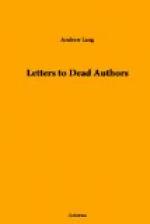Was it not as unhappy a thing, Sir, for you, as it was fortunate for Letters and for Scotland, that you were born at the meeting of two ages and of two worlds—precisely in the moment when bookish literature was beginning to reach the people, and when Society was first learning to admit the low-born to her Minor Mysteries? Before you how many singers not less truly poets than yourself—though less versatile not less passionate, though less sensuous not less simple—had been born and had died in poor men’s cottages! There abides not even the shadow of a name of the old Scotch song-smiths, of the old ballad-makers. The authors of ‘Clerk Saunders,’ of ‘The Wife of Usher’s Well,’ of ‘Fair Annie,’ and ‘Sir Patrick Spens,’ and ‘The Bonny Hind,’ are as unknown to us as Homer, whom in their directness and force they resemble. They never, perhaps, gave their poems to writing; certainly they never gave them to the press. On the lips and in the hearts of the people they have their lives; and the singers, after a life obscure and untroubled by society or by fame, are forgotten. ‘The Iniquity of Oblivion blindly scattereth his Poppy.’
Had you been born some years earlier you would have been even as these unnamed Immortals, leaving great verses to a little clan—verses retained only by Memory. You would have been but the minstrel of your native valley: the wider world would not have known you, nor you the world. Great thoughts of independence and revolt would never have burned in you; indignation would not have vexed you. Society would not have given and denied her caresses. You would have been happy. Your songs would have lingered in all ’the circle of the summer hills;’ and your scorn, your satire, your narrative verse, would have been unwritten or unknown. To the world what a loss! and what a gain to you! We should have possessed but a few of your lyrics, as
When o’er the hill the eastern star
Tells bughtin-time is near, my jo;
And owsen frae the furrowed field,
Return sae dowf and wearie O!
How noble that is, how natural, how unconsciously Greek! You found, oddly, in good Mrs. Barbauld, the merits of the Tenth Muse:
In thy sweet sang, Barbauld, survives
Even Sappho’s flame!
But how unconsciously you remind us both of Sappho and of Homer in these strains about the Evening Star and the hour when the Day metenisseto boulytoide?* Had you lived and died the pastoral poet of some silent glen, such lyrics could not but have survived; free, too, of all that in your songs reminds us of the Poet’s Corner in the ‘Kirkcudbright Advertiser.’ We should not have read how
Phoebus, gilding the brow o’ morning,
Banishes ilk darksome shade!
Still we might keep a love-poem unexcelled by Catullus,
Had we never loved sae kindly,
Had we never loved sae blindly,
Never met—or never parted,
We had ne’er been broken-hearted.




